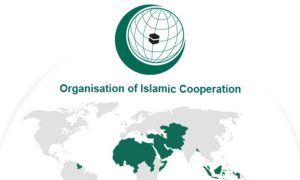ISLAMABAD: Pakistan’s Chief Justice Qazi Faez Isa remarked on Wednesday that the Supreme Court would not tolerate any interference in judicial affairs and is taking the letter penned by Islamabad High Court judges “very seriously”.
A seven-member larger bench headed by the Chief Justice heard the suo motu case regarding the executive interference allegation made by six judges of the Islamabad High Court in a letter they wrote last week to the Supreme Judicial Council. The case was broadcast live on the social media platforms of the Supreme Court.
Other judges on the bench included Justice Mansoor Ali Shah, Justice Yahya Afridi, Justice Jamal Mandokhel, Justice Athar Minallah, Justice Mussarat Hilali, and Justice Naeem Akhtar Afghan.
Chief Justice Isa stressed the importance of ensuring judges’ safety and independence, affirming a policy of zero tolerance for any threats to judicial autonomy. He remarked that the judiciary must be free from external pressures and stated his commitment, along with his colleagues, to defend judicial independence.
Despite this, Chief Justice Isa questioned the absence of demands for a suo motu notice during the four years when no full-court meetings were convened. He clarified that full-court meetings primarily serve administrative functions rather than judicial ones.
Regarding the inquiry into the allegations raised in the letter, the Attorney General presented the government’s decision to appoint former Chief Justice Tasadduq Hussain Jillani to head the inquiry commission. However, Chief Justice Isa expressed dissatisfaction with discussions on social media regarding Justice (retd) Jillani, saying that the formation of the commission falls under the government’s jurisdiction.
Furthermore, the Chief Justice denounced external pressures, including those exerted via social media, regarding the letter and subsequent events. He emphasized the judiciary’s independence from such influences.
In response to petitions being prematurely publicized in the media, Chief Justice Isa expressed disappointment and reiterated his unwillingness to succumb to external pressures, affirming his commitment to uphold the integrity of the judiciary.
The Attorney General assured the court of the government’s support for judicial independence. The Chief Justice emphasized the importance of conducting a thorough inquiry into the matter and bringing facts to light.
The hearing concluded with Justice Mansoor Ali Shah stressing the urgency of addressing the issues raised in the letter, including the protection of judges under pressure. Justice Athar Minallah highlighted concerns about political engineering and emphasized the need for the Supreme Court’s vigilance in addressing such issues.
Justice Athar Minallah remarked that political engineering is continuing. “Everyone knows what is happening, but everyone pretends that nothing is happening,” said Justice Minallah.
Referring to the letter’s contents, Justice Minallah highlighted the judges’ reference to political engineering, noting its persistence since 2017. He remarked that the court cannot ignore the situation, as “a lot is happening”.
Chief Justice Qazi Faez Isa intervened, suggesting the possibility of a full-court hearing in the next hearing to address the matter comprehensively.
Chief Justice Isa suggested the possibility of a full-court hearing in the future to address the matter comprehensively. He urged the Islamabad High Court Chief Justice to utilize the court’s powers effectively to address the concerns raised by its judges.
The hearing was adjourned until April 29.

























